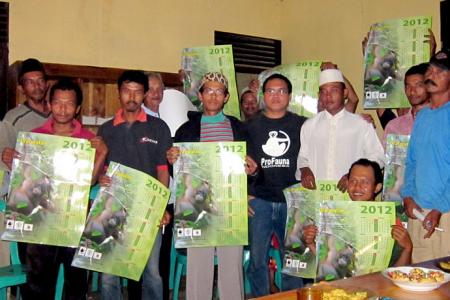Reducing Orangutan-Palm Oil Plantation Conflict through Training and Educational Community Outreach
 The expansion of palm oil plantation has destroyed the forests in Kalimantan. Such activity has triggered a conflict between palm oil plantation companies with the wildlife there, especially orangutan. Orangutans are usually considered as pests by the companies causing the primate slaughter which are intentionally done by the workers. Referring to the slaughter of orangutan in Kutai Kartanegara - East Kalimantan, the crime was systematically committed. The good news was that the perpetrators were found guilty by the judicial courts on 18 April 2012; despite the low punishment, only 8 month imprisonment instead of 5 years according to the Indonesian Law number 5 year 1990 concerning the Conservation of Natural Resources and the Ecosystem.
The expansion of palm oil plantation has destroyed the forests in Kalimantan. Such activity has triggered a conflict between palm oil plantation companies with the wildlife there, especially orangutan. Orangutans are usually considered as pests by the companies causing the primate slaughter which are intentionally done by the workers. Referring to the slaughter of orangutan in Kutai Kartanegara - East Kalimantan, the crime was systematically committed. The good news was that the perpetrators were found guilty by the judicial courts on 18 April 2012; despite the low punishment, only 8 month imprisonment instead of 5 years according to the Indonesian Law number 5 year 1990 concerning the Conservation of Natural Resources and the Ecosystem.
Besides law enforcement, in order to overcome the conflict, ProFauna thinks that a direct educational community outreach towards local people and palm oil companies is important to increase public awareness to protect orangutan. For this reason, ProFauna works together with Yayasan Palung (an active local organization in West Kalimantan) to hold series of public campaigns and trainings starting from May 2012. With the support of the Humane Society International (HSI) the activities were held in Ketapang - West Kalimantan to reduce the conflict.
Ketapang Regency is the largest regency out of 14 regencies in West Kalimantan Province covering 31,588 kilometer2 or 21.8% of the West Kalimantan which is 146,807 kilometer2. The forests of Ketapang Regency comprise of a national park, a nature reserve, limited production forests (HPT), protected forests (HL), and production forests. These forests are the habitats of many rare wildlife like the orangutan (Pongo pygmaeus), the proboscis monkey (Nasalis larvatus), the Muller's Bornean gibbon (Hylobates muelleri), the maroon-leaf monkey (Presbytis rubicunda), the Sun bear (Helarctos malayanus), pangolin (Manis javanicus), slow loris (Nycticebus sp), and many more. These animals, especially orangutans, are threatened by forest conversion into farm and palm oil plantations.
The forest conversion has triggered human-animal conflict. In 2011, there were five cases of human-animal conflict between the locals and orangutans. These also involved some palm oil companies. In Ketapang Regency itself, there are 75 palm oil companies. Between 2010 and 2011, there were a finding of orangutan skeleton in the plantation area of a palm oil company, PT Limpah Sejahtera; a capture of an orangutan baby by another company called PT Andes Sawit Lestari; and the finding of three orangutans in the land clearing area of PT Kayang Agro Lestari.
The trade of orangutan and the Muller's Bornean gibbon in Ketapang is pretty high. According to Yayasan Palung's record, there were 98 orangutans and 89 Muller's Bornean gibbons illegally kept in Ketapang Regency between 2004 and 2010.
Direct Educational Community Outreach to Local People and Palm Oil Companies
 The joint team of ProFauna Indonesia and Yayasan Palung, with the support provided by the Humane Society International (HSI) went directly to the field to hold educational community outreach and training for villagers and workers of palm oil companies in Ketapang, West Kalimantan. ProFauna team gave training to the palm oil workers on the handling of orangutan entering palm oil areas to prevent the killing or hurting of the endangered primate. There have been some palm oil companies interested to follow the training and expressed their commitments not to kill the orangutan entering their areas.
The joint team of ProFauna Indonesia and Yayasan Palung, with the support provided by the Humane Society International (HSI) went directly to the field to hold educational community outreach and training for villagers and workers of palm oil companies in Ketapang, West Kalimantan. ProFauna team gave training to the palm oil workers on the handling of orangutan entering palm oil areas to prevent the killing or hurting of the endangered primate. There have been some palm oil companies interested to follow the training and expressed their commitments not to kill the orangutan entering their areas.
As for the local people, the joint team of ProFauna and Yayasan Palung visited villages or rural communities nearby the palm oil company areas in order to increase their awareness on orangutan conservation. The locals welcomed the community outreach done by the team.
ProFauna hopes that the training and community outreach to the palm oil companies and local people could reduce orangutan slaughter in Kalimantan, especially in Ketapang - West Kalimantan. We will keep you informed on the progress of this orangutan protection campaign in West Kalimantan through ProFauna Indonesia website.
